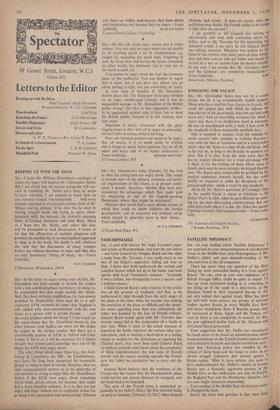SIR,—In his letter on angry young men (AYM), Mr. Donaldson
was kind enough to furnish his readers with a few autobiographical particulars; in doing so, he commented that they might muddle Mr. Hollis. Well, they have certainly muddled me, for I am always muddled by illogicalities. How does he as a self- confessed AYM reconcile his anger that 'England is still riddled with class-consciousness' with his own status as a person with 'a private income . . . and the social position which this brings'? I can vouch for the social circles that Mr. Donaldson moves in, but what interests (and baffles) me more are the circles he argues in. He further implies that there are a considerable number of AYM in Oxford and Cam- bridge; if this is so, I will be surprised, for I always thought that Oxford and Cambridge were one of the things the AYM were angry about.
The other things which anger them (e.g., the Arch- bishop of Canterbury, the BBC, the Establishment, etc.) have for long been recognised by reasonable people as being in need of, reform. However, they are such inconsequential matters as to be unworthy of any emotion so strong as anger (like Mr. Donaldson's letter); if the AYM were angry about something worth while, prison reform, for instance, they might find a more attentive audience. As it is, they are just angry and anger without wit or originality strikes me as being both purposeless and uninteresting. Osborne and Amis are widely read because they have ability and imagination, not because they are angry.—Yours
































 Previous page
Previous page